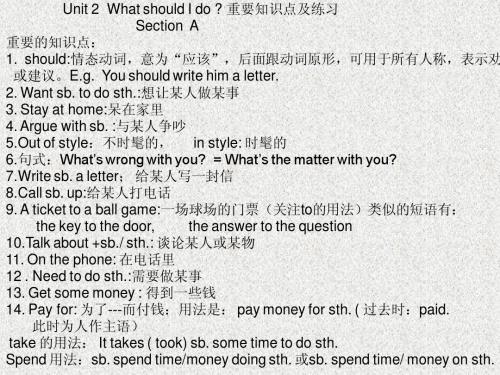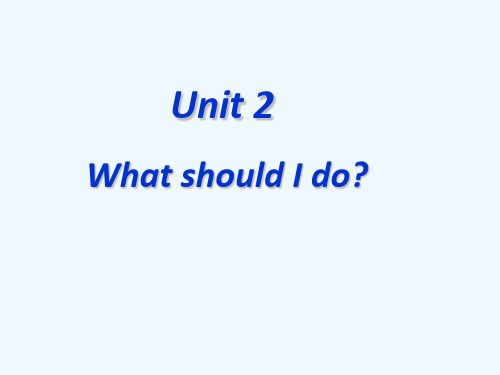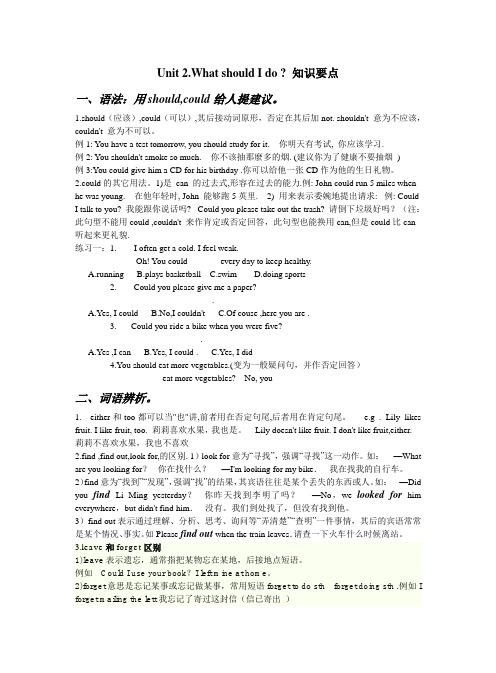初二下册Unit 2 What should I do
八年级英语下 Unit 2 What should I do3课件人教版

II. Match the problem with the advice.
1. I want to be a professional soccer player.
2. I have a math test tomorrow.
3. I don’t want to take the bus.
4. I ‘m really tired.
B: You could get a part-time job. 3.A: This shirt is really ugly.
B: Then you (could / shouldn’t ) use the telephone. 4. A: I don’t like writing letters.
him a letter.
to me.
2. You should tell 2.I don’t like
your problems.
writing letters.
3.You could ask 3.It’s not easy. him to turn it down.
He comes from USA. He wants to practice his Putonghua, But he is very shy. Make a list of thingsing/to one’s surprise
Serious
Not serious
√ My parents want me to stay at home every night. √ My brother plays his CD too loud. √ I don’t have enough money.
original in style inexpensive uncomfortable
英语:Unit_2_What_should_I_do知识点训练课件(人教新目标八年级下)

7.—I think you should go to bed early every day. A. Thank you for helping. C B. Of course. C. It doesn’t matter. D .That’s a good idea. 8.”_______” “I argued with my best friend.” A. How are you? B B. What’s wrong? C. Can I help you? D .Good morning! 三.句型转换: 1 .Could you ask him to give me a call, please? (改写同义句) Could you ask him to _____ _____ ______, please? call me up 2 .Dave had a headache last night.(对划线部分题问) _____ _____ _____ _____ with Dave? What the matter with 3. You should buy some new clothes. What should do _____ _____ I _______? 4. He should ask their parents for some money.(否定句) shouldn’t ask any He ________ _____ their parents for ______money. 5. The room is too small to hold so many people.(同义句) big enough The room isn’t ______ ______ to hold so many people. 6. His father bought him a new computer.(同义句) His father bought a new computer _____ him. ______ for 7.Tom spent 20 yuan on a book last Sunday.(同义句) paid for Tom _____ 20 yuan _____ a book last Sunday. 8.The box is too heavy for me to carry.(同义句) The box isn’t light enoughfor me to carry. _____ _____ 9. Anna paid 200 yuan for the new jacket.(同义句) Anna spent yuan _____ the new jacket. ______ on
八年级英语下 Unit 2 What should I do4课件人教

Thank you for your advice. We get on well again.
I want to buy a guitar. But I don’t have enough money. What should I do?
1. Don’t buy a guitar. 2.You could wait until next year. 3. You could get a part time job. 4. You could buy a used guitar.
Unit 2 Wh’ s wrong with him? What should he do?
My clothes are out of style. What should I do?
Maybe you should buy some new clothes.
Discussion: What’s the matter with these children? What could they do? What should we do?
His parents want him to stay at home every night. What should he do?
•1、纪律是集体的面貌,集体的声音,集体的动作,集体的表情,集体的信念。 •2、知之者不如好之者,好之者不如乐之者。 •3、反思自我时展示了勇气,自我反思是一切思想的源泉。 •4、在教师手里操着幼年人的命运,便操着民族和人类的命运。一年之计,莫如树谷;十年之计,莫如树木;终身之计,莫如树人。 •5、诚实比一切智谋更好,而且它是智谋的基本条件。 •6、做老师的只要有一次向学生撒谎撒漏了底,就可能使他的全部教育成果从此为之失败。2022年1月2022/1/192022/1/192022/1/191/19/2022 •7、凡为教者必期于达到不须教。对人以诚信,人不欺我;对事以诚信,事无不成。2022/1/192022/1/19January 19, 2022 •8、教育者,非为已往,非为现在,而专为将来。2022/1/192022/1/192022/1/192022/1/19
八年级英语下Unit 2 What should I do

八年级英语下Unit 2 What should I do?主备人:姚晓玲编审:姚晓玲学案(2) Section A 3a,3b,4一、学习目标:1.重点掌握下列词汇短语:(1)pay for (2)ask for (3)either (4)join2.能熟练运用下列句式对话:(首先翻译并背诵出来)(1)I need to do sth. (2)You could do……(3)I think you should……Step1预习预习提示 1.表示“花费”的词pay意为“花费(金钱)”,主语为人。
常用短语:pay some money for sth(为……而付款),pay sb(付款给某人),pay for sth(为……而付款)。
cost意为“花费(金钱)”,物或事是主语。
常用短语:sth cost sb some money// sth cost some money。
take意为“花费(时间)”,主语不能是人。
常用结构:It takes sb some time to do sth。
其中take是形式主语,真正的主语是后面的不定式to do sth。
spend意为“花费(金钱/时间)”,主语为人。
常用结构:(1)spend time/money on sth.(2)spend time/money (in) doing sth. (大家应该看明白了吧,讨论一下,然后分别造个句子吧。
)2.either(也)和too, as well, also(也)的区别。
(1)either adv. 只能用于否定句中。
We don’t like it, either.(2)too和as well用于肯定句中,放在句末。
also也用于肯定句中,不过它常置于行为动词之前,助动词和情态动词之后。
I like pop music, too. She’ll play soccer as well. They are also in Class 4.相信结合上面的知识,大家预习得差不多了吧,那就让我们来共同检查一下吧!Step2 合作探究:1.Which advice is the best for you ? Why ?2. Do you have any other idea for Eve?3.Make a list of things Jim can do (Finish part 4)Step3课堂检测:A.根据句意及首字母完成单词。
八年级英语下册unit 2 what should i do人教版

Unit 2 What should I do? (一)本单元语言目标:1. 谈论在学校和家庭中遇到的种种麻烦和问题。
2. 为他人找到合理的解决办法,提出相应的建议。
3. 为自己的问题找到解决办法。
(二)重点单词:1. play v. 播放2. loud adj. 高声的;大声的3. argue v. 争论,争吵4. wrong adj. 错误的;有毛病的;不适合的5. could v. can的过去式6. ticket n. 票,入场券7. surprise v. 使惊奇;使意外8. other adj. 任一的;(两方中的)每一方的9. except prep. 除;把......除外10. fail v. 失败11. football n. 足球12. until prep. 到......为止13. fit v. 适合,适应14. include v. 包括;包含15. send v. 发送,寄16. themselves pron. 他们自己(反身代词)(三)重点词组:1. keep out不让......进入2. out of style不时髦的;过时的3. call sb. up打电话给......4. pay for付款5. ask for要求6. the same as与......同样的7. in style时髦的;流行的8. get on相处;进展9. as much as possible尽可能多10. all kinds of各种;许多11. on the one hand, ......(在)一方面,......12. on the other hand, ......另一方面,...... (四)重点句型:1. What should I do?我应该怎么做?2. You could write him a letter.你可以写信给他。
3. What should he do?他应该怎么做?4. Maybe he should say he's sorry.也许他应该说抱歉。
八年级英语下册_unit2_what_should_I_do课件人教版

My parents want me to stay at home every night. My brother plays his CDs too loud.
播放
大声的
I don’t have enough money.
I argued with my best friend.
和某人争吵
My clothes are out of style.
He doesn’t know the way … He should ask someone for help.
What should he do?
He is too fat.
He should exercise every day.
argue with
in style
out of style
1a Look at these problems. Are they serious or not?
Write them in the appropriate box.
Serious
Not serious
My parents want me to stay at home every night.
Unit 2 What should I do?
Section A
What’s wrong with the dog?
I often feel very tired. What should I do? You look worried. What’s the matter?
What should he do?
不时髦的
Look at the problems in activity 1a and make conversations.
人教版八年级英语下册unit2WhatshouldIdo

人教版八年级英语下册unit2 “ What should I do?”这个单元跟我们在八年级上册学习的关于对别人身体健康状况所提建议的句子是一样的,只不过在这个单元里,我们的学习范围扩大了,不仅仅是关于疾病的建议了,更多的是关于学习,生活和工作上所遇到的各种各样的困惑和麻烦,针对这些问题,给出合理的建议和使用什么样的句型比较好,这就是我们这节课所要学习的主要内容了。
在英语学习中,关于提建议的句型有很多,但在这个单元,我们主要是要掌握两个句型:“You should\shouldn’t …..”和“youcould\couldn’t….”主要是让学生用英语谈论自己的难题和向别人提建议,在引入方面我用猜测游戏的形式复习上册的关于疾病的问答,让几个学生轮流用表情表示不舒服,一个学生提问:What’s the matter? 各组学生竞猜,猜对后表演的学生问 What should I do?各组又举手抢答,表达正确加分在小组上。
接着先让学生结合自己的实际情况谈论学校和家庭中的种种麻烦和问题,例如: I argued with my best friend. I don’t have enough money .My math is poor 。
My clothes are out of style 等等.然后,我接着示范用should和could 来提建议,让学生去体会两种说法的区别,再让学生自己给有难题的同学提建议,为他人找到合理的解决办法,提出相应的建议及为自己的问题找到解决办法。
让学生使用“good idea”“okay idea”或“bad idea”表达对建议的看法。
接着,让学生练习情景对话,两人一组编对话,围绕问题,让学生给出Advice----具体用主题句:What should I do? / You could/ should/ shouldn’t….进行口语操练.然后再利用小组竞赛的方式让学生针对之前提出的难题提建议,比比谁提的建议最多,最好。
八年级英语下册-unit2-What-should-I-do整单元课件-人教新目标版

argued with
What's wrong? What should she do?
What's wrong? What’s the matter? What should she do?
...plays his CDs too loud
A: What's wrong? B: My clothes are out of style. A: Maybe you should buy some
Everybody has his or her problems.
I have mine. What's it? My mom plays music too loud. I can't stand it at all. What should I do? You should...
play v.播放
2a Listen. Peter's friend is giving him advice. Circle the word "could" or "should".
____________________
give him a call ______________ phone him
__________________________
2b Listen again.
Why doesn’t Peter like his friend’s advice?
Draw lines to match the advice with the reasons.
Advice
1. You could write him a letter. 2. Maybe you should call him up. 3. You should say you’re sorry. 4. Maybe you could go to his house. 5. You could give him a ticket to a ball game.
八年级英语下册Unit 2 What should I do- 知识讲解

八年级英语下册Unit 2 What should Ido? 知识讲解Unit2whatshouldIdo?【单元目标】1.单词与短语stereo,loud,argue,original,serious,style,wrong,argu ment,either,teen,talk,family,tutor,haircut,caller,e xcept,upset.wantsb.todosth. 2.playone’sstereo 3 stayathome4.arguewithsb/haveanargumentwithsb.5.beoutofstyle6.writesbaletter/writeto7.talkabout8.onthephone9.surprisesb.10.payfor 11.getapart-timejob 12.borrowsth.fromsb.13.asksb.for…14. haveabakesale 15.findout16.beupset17. call…up 18.thesameas9. getonwellwithsb.20. returnsth.21.haveafightwithsb.22.from…to…23. dropoff 24.preparefor25.after-schoolclubs26.beusedto27.fillup 28.takethemiddleroad2.目标句型:.whatshouldIdo?2.whydon’tyou…?3.youcould…4.youshould…5.youshouldn’t…3.语法情态动词的用法Ⅰ【重难点分析】情态动词Ⅰ*情态动词也可称为“情态助动词”,因为它和基本助动词都属于助动词类。
*情态动词和其他动词连用,可表示说话人的语气。
*情态动词可表达建议、要求、可能和意愿等。
*情态动词没有人称和数的变化。
*常用的情态动词有:can,could,may,might,must,shall,should,will,would这九大情态动词;其他的还有oughtto,need,dare等。
八年级英语下册_unit2_what_should_I_do课件人教版

Yours,
Mary
I. 根据汉语提示,完成下列句子。每空一词。
1. 我花了五美元买这些书。 paid for spent on I ________ five dollars ________ the books. 2. 我问他如何才能学好英语。 how to learn I asked him _______________ English well. 3. 你认为她会和你就那件事争吵吗? argue with about Do you think she will _________you ________ that?
Language points:
1. find out,找出;查明 find out 意为“找出” “发现” “ 查出(真 相) ” find和find out都有发现的意思,二者的语义差别是:find往往指凭一时的
直接感觉或偶然发现,而find out则需经一番努力后发现出来,有“查明,
弄清”的意思。
2. I don’t know what to do. 我不知道该做什么。
疑问词 + 动词不定式结构,表示一个完整的 含义,在句中可以做主语,宾语,表语等。 这种结构经常放在tell,show,teach,forget,find out等词后作宾语。
I can’t decide where to go for vacation. I asked her how to make dumplings.
Language points:
tell sb. to do sth. 告诉某人做某事 Mother told me to have healthy food to keep fit. tell sb. not to do sth. 告诉某人不做某事 The teacher tells us not to talk in class.
人教版八年级下册英语第二单元unit2知识点

人教版八年级下册英语第二单元unit2知识点Unit 2 What should I do?一丶重点短语1.argue v.争论;争吵argue with sb.与某人吵架I argued with my best XXX.我和我的好朋友吵架了。
2.① XXX.(用于否定句)也He doesn’t have any money。
and I don’t。
either.他没有钱,我也没有。
I can’t play chess。
She can’t。
either.我不会下国际象棋,她也不会。
② too 也(用于肯定或疑问句)I’m XXX a XXX。
too.我是老师,他也是老师。
3.ask (sb.)for sth.向某人寻求某物;要……Don't ask for food every day.Go and find some work.别天天要饭,找点儿工作做。
I don’t think you should ask your parents for some money.我想你不应向父母要钱。
4.the same as。
与……相同(注意前后两个比较对象的属性保持一致)XXX same asmy friends'.这些衣服与我朋友的一样。
Tom is the same age as Anna.=Tom is as old as Anna.汤姆和XXX一样大。
Her backpack is the same as XXX.她的背包与我的一样。
5.except除……之外;(不包孕……在内)My class has been XXX.除我之外,我的同砚都被约请了。
All the students went to the park except him.除他之外,部分同砚都去过公园了。
XXX.除了她以外,所有的学生都去美国旅行过。
注意区别:besides除……以外,还有。
(包括在内)We all went there besides him.除他去以外,我们也都去了。
Unit 2.What should I do 知识要点

Unit 2.What should I do ? 知识要点一、语法:用should,could给人提建议。
1.should(应该),could(可以),其后接动词原形,否定在其后加not. shouldn't 意为不应该,couldn't 意为不可以。
例1: You have a test tomorrow, you should study for it. 你明天有考试, 你应该学习.例2: You shouldn't smoke so much. 你不该抽那麼多的烟. (建议你为了健康不要抽烟)例3:You could give him a CD for his birthday .你可以给他一张CD作为他的生日礼物。
2.could的其它用法。
1)是can 的过去式,形容在过去的能力.例: John could run 5 miles when he was young. 在他年轻时, John 能够跑5英里. 2) 用来表示委婉地提出请求: 例: Could I talk to you? 我能跟你说话吗? Could you please take out the trash? 请倒下垃圾好吗?(注:此句型不能用could ,couldn't 来作肯定或否定回答,此句型也能换用can,但是could比can听起来更礼貌.练习一:1.------I often get a cold. I feel weak.------Oh! You could _______every day to keep healthy.A.runningB.plays basketballC.swimD.doing sports2.------Could you please give me a paper?--------________________.A.Yes, I couldB.No,I couldn'tC.Of couse ,here you are .3.-----Could you ride a bike when you were five?-------______________.A.Yes ,I canB.Yes, I could .C.Yes, I did4.You should eat more vegetables.(变为一般疑问句,并作否定回答)________ ________ eat more vegetables? No, you __________二、词语辨析。
人教版八年级英语下册《nit 2 What should I do. Unit 2 What should I do.(通用)》课件_2

Word Study
talk find out call up argue say
1. Let’s _c_a_l_l_u_p_ Joe and invite him to play tennis.
2. You should _t_a_lk__ about your problems with your parents.
1. I thought I failed my test but I just found out I passed!
2. I get on well with my cousin who is the same age as me.
Reading and writing
What’s Looking for help’s problem? the same … as get on well have a fight with… What’s your advice?
Listening 2b
Person Kim Nicole Emilio
Advice
Tell your friend to get different clothes and a different haircut. Be happy that your friend likes your clothes and haircut.
Listening
My parents want me to stay at home every night. My brother plays his CDs too loud. I don’t have enough money. My clothes are out of style.
Listening
New words
人教版八年级下unit2What should I do

知识回顾:1、名词复数所有格变化规则,变成复数-s/-es后加“’”或不以s结尾的复数名词,直接加“’s ”2、宾语从句中,如果从句是疑问句,那么从句用陈述语序I can’t think what I did wrong.(一)本单元语言目标:1. 谈论在学校和家庭中遇到的种种麻烦和问题。
2. 为他人找到合理的解决办法,提出相应的建议。
3. 为自己的问题找到解决办法。
(二)重点词汇1.keep v.保留,保存;保持(1)保留座位______ _______ ________饲养宠物______ _______ ________保管书本______ ______ _________(2) keep … out of (地点) 不让… 进入keep off the grass 勿踏草地(3) keep sb./sth.+adj.保持…成某种状态keep sb. doing sth.让某人一直做某事keep (on) doing sth继续做某事,一直做某事2 . play v. 播放,玩player n. 播放器/运动员eg.播放CD播放器 _____ a ______ ________3. enough adj/adv.足够(1)enough+名词I have _____ _____ _____the book.我有足够的钱买那本书。
=I have _____ ____ ______the book.(2) 形容词/副词+enough ,意为“足够的,十分地”足够好_____ ______十分贵_____ ______(3)enough … to …足够…可以…The girl is ___________________. 那女孩年龄足够大可以上学了。
4、argue v.争论,争吵,辩论(1)与某人争论某事argue _________ sb _________ sth5.wrong adj.错误的,有毛病的,(1)你怎么了?(用来询问别人发生了什么事情最常用的句型)What’s______ ______you?=What’s _____ _____ _____ you?=What’s ____ ____ _____ you?=What’s up?(2)Something is wrong.=There is something wrong with…表示“…出毛病了”Everybody goes to the library ______ me. (“加上”)14、give sb sth =give sth to sbwrite a letter to sb=write sb a letter=write to sb 反义词:get/receive a letter from sbbuy sb sth =buy sth for sbborrow sth from sb (借入)lend sth to sb (借出) = lend sb sth send sb. sth = send sth to sbsend的过去式____15、idea n.主意,念头I don’t know.=I _____ ______ ______.know = ______ _____ ______16、区分like 和as(1)as : 完全相同; like:相似(2)as +从句(或省略的从句); like +名词(或代词)We had better treat it _____ a joke.I worked _____ a slave.I have the same idea ______ you have.She is dressed in white _______a nurse.17、情态动词could和should的用法(1)should表示“劝告、建议”,译为应该(2)表示“建议”,比can 更委婉,此时could 是独立的情态动词,不是can 的过去式。
新课标人教版八年级英语下册Unit 2 What should I do(1)

Unit 2 What should I do(1)单元教材分析学会should ,Why don’t you和could在英语中的习惯用法。
使用这些习惯用法,就自己生活、学习中存在的某些实际问题提出建议;拒绝、接受别人的建议。
在学习贴近学生生活实际的语言知识的同时,特别关注学生生活和学习中的真实困难和烦恼。
进一步引导学生对自我和周围世界进行比较客观的认识、评价,发展学生主动解决问题的自我意识和行为能力。
发展学生与人和谐交往的能力;培养在学生交流中寻求帮助。
既坚持自己观点、又听取别人建议。
单元总体目标1. The students will learn to talk about problems.2. The students can help people in trouble and how to give advice.3. Practice the sentences with “could, couldn’t, shouldn’t”.4. To learn the words and expressions about reading passage.单元重难点一览单元学情分析In this unit students learn to talk about problems and give advice. First make up a problem you might be having and write you could do about it. Secondly read the problem to the class again and help the class give advice using the words could, should, shouldn’t. In the end, make sentences with the words and write some letters or make conversations.单元教学建议Ask the students to read papers or magazines to find some problems the people have, then ask the students to make a chart with each problem. Ask some students to write a paragraph about the worst advice they ever got, and guess what the problem is. Maybe ask three or five students to work in group for a radio talk show where people call in for advice.单元课时分配Five periods第一课时教学内容1. To learn the words and expressions about this period.2.To talk about the problems serious or not for them in daily life.3.To learn how to describe the problems you have or how to help others to give him orher some advice.教学目标知识与能力1. Knowledge aims: Words and expressions; How to use should, could, shouldn’t;2. Ability aims: Express the good ideas to solve the problems;Help others when they are in trouble.过程与方法首先谈论生活中严肃或不严肃的事情;通过听力训练和口语表达学会如何表达自己的困难,如何给别人提建议等;通过谈论表达自己对有些困难的理解,提出个人不同的建议。
- 1、下载文档前请自行甄别文档内容的完整性,平台不提供额外的编辑、内容补充、找答案等附加服务。
- 2、"仅部分预览"的文档,不可在线预览部分如存在完整性等问题,可反馈申请退款(可完整预览的文档不适用该条件!)。
- 3、如文档侵犯您的权益,请联系客服反馈,我们会尽快为您处理(人工客服工作时间:9:00-18:30)。
初二下册Unit 2 What should I do?一周强化一、一周课程概述1.学习谈论在学校和家庭中遇到的种种麻烦和问题。
2.学习为他人找出合理的解决办法,提出相应的建议。
3.学习情态动词should, could 提建议的用法。
4.小结如何征求意见和提出建议二、重难点知识讲解1.I don’t have enough money. 我没有足够的钱。
enough 的用法(1)修饰名词,放在它所修饰的词之前或之后,意为“足够的;充足的”。
I have enough money(money enough)for the book. 我有足够的钱买那本书。
You have enough time(time enough)to do it. 你有足够的时间来做这件事情。
(2)修饰形容词或副词,放在形容词或副词之后,意为“足够地;十分地”。
The clothes are dear enough.那些衣服十分贵。
Is this good enough?这个够好吗?(3)enough to…足够……可以……The girl is old enough to go to school. 那女孩到了上学的年龄了。
2.I argued with my best friend. 我与我最好的朋友争论。
argue v. 争辩;争论;辩论argue的过去式和过去分词是在词尾加-d, argued;现在分词去e加-ing, arguing;其同义词是quarrel。
常用短语:argue with /against sb. about /on/over sth. 与某人辩论某事I often ague with my friends about the problem.我经常和朋友辩论那个问题。
3.My clothes are out of style. 我的衣服过时了。
style n. 衣服等的式样the style of 60s60年代的式样out of style过时的;落伍的反义词组:be in style=be in fashionThis type of dress is now in style /fashion.这种裙子现在很流行。
Most of my clothes are out of style /fashion.我的很多衣服都过时了。
拓展:(1)out of work 失业;下岗The woman is out of work. 那个妇女下岗了。
(2)out of danger 脱离危险The man has been out of danger. 那人已脱离了危险。
(3)out of control失去控制The machine was out of control. 那机器失去了控制。
(4)Get out of the way! 滚开!(5)out of…在……外面;从……里出来He came out of a room. 他从一个房间里走出来。
Don’t look out of the window. 不要向窗外看。
4.Maybe you should buy some new clothes. 也许你应当买一些新衣服了。
maybe adv. 相当于perhaps,作“也许;可能’’讲。
maybe是一个单词,不可写为两个单词。
maybe通常位于句首,在句中作状语。
may be是“情态动词may+动词be”构成的,作谓语,意思是“也许是;可能是”。
试比较:Maybe/ Perhaps you put it there. 也许你把它放在那里了。
It may be a hat. =Maybe it is a hat. 它也许是顶帽子。
should情态动词,表示责任、义务或理所当然,意思是“应当;应该”,后跟动词原形。
它也是shall的过去式。
We should come to school on time. 我们应当按时到学校。
You should obey the rules of your school. 你们应当遵守学校的规章。
5.I don’t want to surprise him. 我不想使他吃惊。
surprise v. 使惊奇;使诧异;使感到意外surprise的过去式和过去分词是surprised;它的形容词形式是surprising。
surprise还可用作名词,意思是“惊奇,诧异”。
You surprise me! 你吓了我一跳!What a surprise to see you here! 在这里见到你真是意外!拓展:(1)be surprised感到吃惊(惊奇)We are very surprised at the news. 听到这个消息,我们非常吃惊。
(2)in surprise惊奇地Rose looked at her mother in surprise.罗斯惊奇地看着她母亲。
(3)to one’s surprise使某人吃惊(惊奇)的是To my surprise the door was unlocked.使我吃惊的是门没有锁。
(4)take…by surprise使……感到意外His answer took us by surprise. 他的回答使我们吃惊。
6.I need to get some money to pay for summer camp. 我需要得到一些钱来为夏令营付款。
need v.需要辨析:need to do与need doingneed to do和need doing都表示“需要做某事”,两者在用法上的不同在于当主语是人时,通常用need to do;当主语是物时用need doing。
如:They need to rest for a while. 他们需要休息一会儿。
Our classroom needs cleaning now. 我们的教室现在需要打扫了。
注意:need doing 也可用need to be done(不定式的被动式)来表示。
My watch needs to be repaired. 我的手表需要修了。
need还可用作情态动词,这时无时态和人称的变化,通常用于否定句和疑问句中,其后跟动词原形。
如:Need I go? 我需要去吗?You needn’t go there. 你不需要去那里。
needn’t可以用not have to来替换,但在回答must引起的一般疑问句时,其否定回答只能用needn’t。
在过去时和将来时的句子中,只用have to,不用need。
如:-Must I go home now? 现在我必须回家吗?-No, you needn’t. 不,不需要。
He had to give up smoking. 他不得不戒烟了。
You won’t have to come here next week. 下周你不必来这里。
pay for 为……付款(pay…for…)I’ll pay for it.我来付款。
I paid 5 yuan for the drink. 饮料我付了5块钱。
How much did you pay for the bike? 买自行车你花了多少钱?Did you pay him 100 yuan for the old watch? 这块旧手表你付了他100块?=Did you pay 100 yuan to him for the old watch?7.I have an idea. You could borrow some money from your brother.我有一个主意,你可以向你哥哥借一些钱。
(1)borrow v. 借;借用May I borrow your pen? 我可以借用一下你的钢笔吗?borrow money from a friend向朋友借钱辨析:borrow与lendborrow是指向别人借东西,即“借入”;lend是指把东西借给别人,即“借出”。
borrow常用的句型是borrow sth. from sb. 向某人借某物;lend常用的句型是lend sth. to sb. 把某物借给某人。
如:I borrow books from the library every month. 我每个月都从图书馆借书。
Do you often lend story-books to him? 你常借给他故事书吗?注意:lend sth. to sb. 也可用lend sb. sth. 来表示。
如:Can you lend your bike to me? =Can you lend me your bike?你能把自行车借给我用一下吗?He lent me his dictionary.他把字典借给了我。
=He lent his dictionary to me.=I borrowed his dictionary. 我借了他的字典。
=I borrowed a dictionary from him.(2)idea n. 主意;念头He has a good idea. 他有个好主意。
注意:(1)I hav e no idea. =I don’t know. 如:I have no idea when we will have sports meet.我不知道我们什么时间开运动会。
(2)在口语中,What’s your idea?你有什么主意?/你的意见如何?多用来征求别人的意见、看法等。
如:What’s your idea about this plan?你对这次计划有何意见?(3)赞成他人意见时,可用That’s a good idea.或Good idea!好主意(好办法)!8.Jim could join a club. 吉姆可以加入一个俱乐部。
join v.加入;参加join the party入党join the league入团join the army参军拓展:(1)join连接;结合;相连join one thing to another将一物与另一物连接起来Where do the two rivers join each other? 这两条河在何处汇合?(2)join sb. in sth. /in doing sth. 与……一起(做某事)Will you join me in a walk? 你愿意和我一起去散步吗?(3)join…to…把……和……连接起来The new railway has joined this city to that one.这条新铁路把这个城市与那个城市连接起来。
